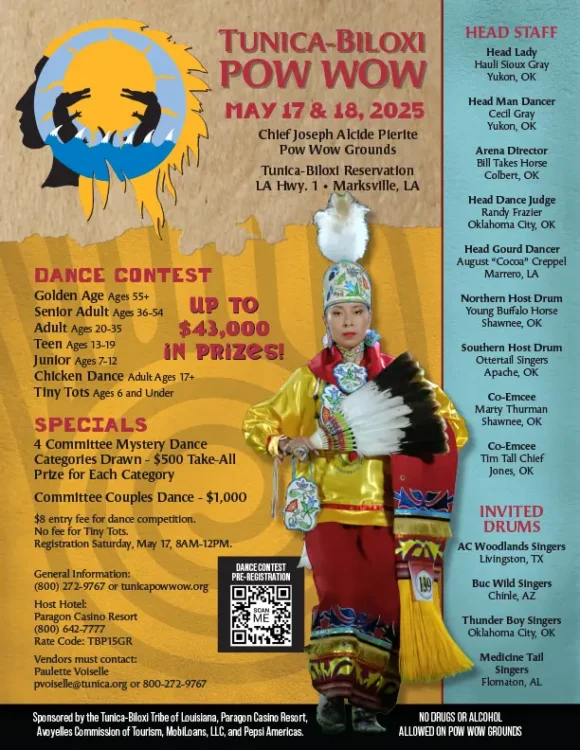Project will utilize Tunica-Biloxi manuscripts to develop a pilot example of a new digital archiving platform

Pictured: Sesostrie Youchigant the last known fluent speaker of Tunica and the third of Tunica’s 14 notebooks that this project will be based off of.
Marskville, LA – The Tunica-Biloxi Tribe of Louisiana’s Language and Cultural Revitalization Program (LCRP) has begun working with The American Philosophical Society (APS) on their newly-launched Indigenous Language Manuscript Interface (ILMI) project. The project was made possible by a grant from the National Science Foundation (NSF) and will contribute new solutions to the widespread issues found in linguistics and archiving.
“Part of the challenge when exploring Indigenous languages is having access to existing resources and information,’” said Brian Carpenter, Curator of Native American Materials for the APS Center for Native American and Indigenous Research. “We have worked with Tunica-Biloxi since 2014 through their incredible journey of revitalizing the Tunica language from ‘dormant’ to ‘reawakened.’ Because of the Tribe’s extensive archives and years of research, we knew that they would be the best partner for us in showcasing the capabilities of this new platform. We hope that this project opens doors for both Tunica-Biloxi and other Tribes interested in exploring their native languages.”
Through the project, Tunica-Biloxi will partner with APS, which houses the oldest archive of Indigenous languages, cultures and histories in the United States. Together, the Tribe and APS will create a new addition to archives-based, open-source platforms, allowing researchers to navigate and view digitized original pages of manuscripts written in endangered languages in new, enhanced ways. The platform will also house data about the original text and information added by linguists and community language experts. The goal of this platform is to make all resources readily available to larger audiences thus encouraging the exploration of Indigenous languages.
“We are very proud of all that we have accomplished in our journey of revitalizing the Tunica language and thrilled for the opportunity to make language exploration more accessible for others,” said John Barbry, Director of Development and Programing for the Tunica-Biloxi Language and Culture Revitalization Program. “There is so much that can be learned about a tribe’s culture and history by understanding their language. We hope that through this project we can encourage other Tribes to embark on their own linguistic journey.”
This partnership will focus on the 1930s Tunica language notebooks of Mary Haas and the last known fluent Tunica speaker, Sesostrie Youchigant. The Tribe’s language experts and apprentices will produce transcripts, transliterations and additional information, which will integrate community expertise into the project and provide opportunities for language apprentices to expand their training.
The finished product will be a full Tunica language portal hosted by the APS which will be shared with researchers and used as a model for how other linguists can utilize the capabilities of this platform to enhance the usability of their manuscripts.
“We are thrilled to be a part of this project and grateful for the opportunity to serve as an example for other Tribes that are interested in learning more about their language and culture,” said Marshall Pierite, Chairman of the Tunica-Biloxi Tribe. “Thank you to APS and the National Science Foundation for your commitment to supporting us and other Tribes in our mission of uncovering our past.”
For more information on the project, click here.
###
About the American Philosophical Society
The American Philosophical Society, established in 1743 by Benjamin Franklin for the purpose of “promoting useful knowledge,” is the nation’s oldest learned society. An intellectual bedrock of the early United States, the APS counts nearly all of the nation’s founders as Members of the Society. Election to Membership honors those who have made exceptionally significant contributions to science, the arts and humanities, and public life. The Society promotes scholarly research through its Library, including 40 fellowships each year, and through its research grant program. The Society sustains an informed citizenry through twice-yearly meetings and topical conferences and symposia. Public programs and museum exhibitions, which often draw close to 200,000 visitors annually, are inspired by the APS Library & Museum collections, which include 14 million pages of manuscripts, 275,000 books, and approximately 3,000 artifacts and fine art objects. The collection is strongest in early American history, Native American history and culture, and the history of science. APS publications are dedicated to publishing research that reflects a broad range of useful knowledge and is the oldest continuously operating scholarly press in the country.
About the Tunica-Biloxi Tribe
The Tunica-Biloxi people first appeared in the Mississippi Valley. In the late 1700s, they settled near Marksville, where they were skilled traders and entrepreneurs. Today, the Tribe has more than 1,200 members throughout the United States, primarily in Louisiana, Texas and Illinois.
The Tunica-Biloxi Tribe received federal recognition in 1981 for its reservation within the boundaries of Louisiana. The tribe owns and operates the Paragon Casino Resort, the largest employer in Central Louisiana. Through its compact, negotiated by the late Tribal Chairman Earl J. Barbry Sr. and the State of Louisiana, the Tribe has assisted local governments in the area with its quarterly distribution of funds, totaling more than $40 million over two decades. For more information about the Tunica-Biloxi Tribe of Louisiana, visit www.tunica.org and “like” us on Facebook.
